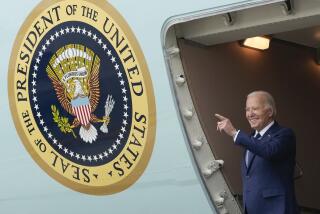Select or Elect? Iraqis Split on Constitution Delegates
- Share via
BAGHDAD — A committee that is debating how to draft a new constitution is leaving the crucial question of how to choose constitutional convention delegates to the 24-member Iraqi Governing Council, all but assuring that it will be a month or two before the process even begins.
At stake in deciding how to choose the drafters of the constitution is the amount of influence Iraq’s most radical religious elements are likely to have. The two best-organized groups in Iraq now are clerics and former members of Saddam Hussein’s Baath Party. Other than Baathists, secular political figures have yet to gain a national following.
The committee, which will submit its report to the Governing Council today or Tuesday, could suggest as many as seven options, according to council members and Western diplomats close to the process. They will range from holding an election to choose the 100 to 150 people who will draft the constitution to appointing delegates from experts around the country. There will also be recommendations for combining the two options, electing some members and appointing others. And there may be an option for a temporary or interim constitution.
It is expected that once the drafters are chosen, they will take about six months to write the constitution, which will then be put to a national referendum. After that, there will be a political campaign for the country’s elective offices and then the U.S.-led Coalition Provisional Authority would transfer full power to the Iraqis.
The writing of the constitution “will be like a battle,” said Saad Shakir, a deputy to Governing Council member Adnan Pachachi. If an election is held now for drafters of the constitution, he added, “we will have an Islamic republic immediately.”
“There is a degree of polarization on the council about whether to elect or select,” agreed Samir Shakir Mahmoud Sumaiday, a council member who is firmly in the “select” camp.
The council chose the 24-member committee, made up primarily of judges, lawyers and other legal experts, to travel around the country for several weeks to hear what procedures Iraqis want to follow to draft their constitution. The panel’s chairman is a prominent Kurd, Fouad Massum.
Those who write the constitution will be faced with trying to accommodate an array of religious and ethnic groups on questions that include the role of Islamic law and the extent to which the country’s federal states will be configured along ethnic lines. Also in question is the government’s structure. Among the options are a parliamentary system, a constitutional monarchy and a U.S.-style republic.
For the last 23 years, Hussein and the Revolutionary Command Council that he chaired had the final word.
The main supporters of an election for delegates are devout Shiites. That sect, which is thought to constitute at least 60% of the population, is far from monolithic, but its members respect the edicts of prominent Shiite ayatollahs, most notably Grand Ayatollah Ali Sistani, who issued a religious ruling earlier this summer that the drafters of the constitution must be elected.
The U.S.-led occupation authority has avoided making direct recommendations to the Iraqis, but diplomats believe that it would be impossible to hold fair elections now. They are particularly worried that if an election were held now, imams would tell their congregations whom to vote for, several senior officials said. They added that election experts estimate that it would take nine to 12 months to organize an election that would meet international standards.
If some corners were cut, it might be possible to do it in six months, but that would still mean delaying the election of an Iraqi government into 2005.
Many Shiites say U.S. officials exaggerate the potential delay and underestimate the enormous credibility gained by having an election.
“Elections are the best way to choose the people [drafting the constitution], even if we are criticized because of some negative aspects; there would still be much more criticism if the people were appointed,” said Adil Mehdi, a representative of the Supreme Council for the Islamic Revolution in Iraq, whose leader, Abdelaziz Hakim, is a key member of the Governing Council.
“Certainly it’s more representative to have an election than not to have it,” Mehdi said.
One view is that Sistani issued his edict to ensure that Shiites had a majority hand in writing the constitution, but it is also true that Iraqis are worried that Americans will hijack the process of writing the constitution.
Sumaiday, who opposes electing the delegates, argues that there is no way to conduct such a process so that it will be perceived as fair. He ticks off half a dozen problems, including the absence of electoral and voter registration laws and an inadequate voter list.
About 4 million Iraqis live outside the country, and most inside the nation believe the exiles should take part in the elections. Many live in Britain, and large numbers of Iraqi Kurds live in Iran. Figuring out who should vote is a big job.
The lack of security is another potential obstacle.
“It is not inconceivable that there would be some effort to intimidate people into voting one way or another or not voting at all,” Sumaiday said. “I would not put it past the remnants of the Baathists and others working against the current regime to intervene.... Unless we have a way of dealing with such excesses, we cannot say our elections reflect the will of the people.”
More to Read
Sign up for Essential California
The most important California stories and recommendations in your inbox every morning.
You may occasionally receive promotional content from the Los Angeles Times.










